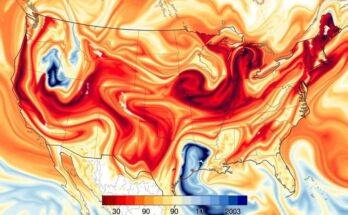Palau’s upcoming election on November 5 coincides with the U.S. midterm elections and reflects the nation’s complex geopolitical situation amid the U.S.-China rivalry. President Surangel Whipps Jr. is seeking re-election based on his pro-U.S. stance, while former president Tommy Esang Remengesau Jr. appeals to environmental and economic cooperation with China. Voter concerns hinge on economic challenges and the management of foreign influence, particularly from China, while the U.S. maintains a dominant defense relationship.
Palau, a small Pacific nation with approximately 18,000 residents, is navigating a critical election on November 5 that coincides with the U.S. midterm elections. The nation’s geopolitical significance is underscored by its strategic location near the Philippines and its historic ties to the United States, evidenced by the recent completion of a military runway aimed at countering China’s expanding influence in the region. As voters face pressing issues such as a fragile economy and escalating living costs, this election embodies a larger struggle for dominance between the U.S. and China in the Pacific. President Surangel Whipps Jr., who has aligned his administration closely with U.S. interests, will compete against former president Tommy Esang Remengesau Jr., who advocates for environmental concerns and has expressed openness towards economic cooperation with China. Whipps aims to reform the economy and deepen security ties with the U.S., while Remengesau emphasizes the need for sustainable development and community involvement. Dr. Michael Green, CEO of the United States Studies Centre, highlights that such small nations often become focal points in international strategic competition. Voter sentiment, articulated by local residents such as truck driver Aiu Andres, reflects economic hardship, with rising import costs exacerbating the situation. Palau heavily relies on U.S. imports, and the relationship is codified in the Compact of Free Association, which grants the U.S. military control over defense in exchange for budgetary support. Whipps seeks to maintain and expand U.S. military presence in Palau, referring to escalating challenges posed by China in the South China Sea. Critics, including Remengesau, argue that U.S. military priorities should not overshadow urgent climate concerns. Remengesau, who is well-known for his environmental initiatives during his presidency, cites the importance of traditional practices and community consultation in policymaking, asserting that true security lies in addressing climate change rather than militarization. The candidates also differ regarding fiscal policies, particularly a recently imposed goods and services tax aimed at revenue generation amid over-dependence on tourism, which accounts for 40% of Palau’s GDP. Remengesau pledges to create opportunities for smaller local businesses, countering what he views as unfair advantages for larger enterprises linked to Whipps. The relationship with China remains complex; while there are concerns about Chinese influence, some local voices advocate for engagement and commercial opportunities. Ultimately, this election highlights the delicate balance Palau must strike between maintaining its longstanding alliance with Taiwan and navigating China’s proactive economic outreach. The outcome may set the course for Palau’s future diplomatic and economic engagements, as well as its sustainability initiatives.
The political landscape in Palau is significantly influenced by its geopolitical position and historical ties to both the United States and Taiwan. The upcoming election serves as a litmus test for the nation’s direction amidst increasing tensions between Washington and Beijing. Palau, which enjoys diplomatic relations with Taiwan, stands at the confluence of U.S. strategy in the Pacific and China’s expanding reach, particularly in the context of resource management and climate change. Economic challenges further complicate the decision-making landscape, as both candidates propose different approaches to address these pressing issues while navigating international relations.
In conclusion, the November 5 election in Palau represents more than just a local governance matter; it indicates broader geopolitical ramifications as the nation contemplates its future between established alliances and new potential partnerships. The outcome will reveal the electorate’s priorities concerning economic stability, environmental sustainability, and international diplomacy—factors critical for Palau’s positioning within the competitive Pacific arena.
Original Source: www.theguardian.com




